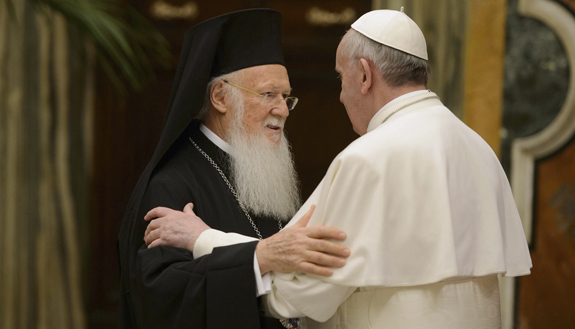
ROME. While Synod-2018 was trying to grasp the polyhedron-like character of “synodality” and wrestling with the differences among sexual inclination, sexual orientation, and sexual attraction, tectonic plates were shifting beneath the surface of world Christianity.
Like similar shifts in geology, which can produce tsunamis and earthquakes, dramatic movement in the underlying structures of ecclesiastical life can lead to great historical consequences. The recent decision by the Ecumenical Patriarchate of Constantinople to grant autocephaly to a unified Ukrainian Orthodox Church — which would mean its independence from the Russian Orthodox Moscow patriarchate — would be precisely such a dramatic, tectonic shift; perhaps the greatest in Eastern Christianity since Constantinople and Rome formally severed full communion in 1054.
This is, then, a Very Big Deal. That it got virtually no attention during Synod-2018, either inside the Synod hall or in the Synod’s “Off-Broadway” conversations, says something (not altogether edifying) about the self-absorption of Catholicism as it continues its seemingly endless wrestling with the ethics of human love, the exercise of authority in the Church, and a raft of sexual and financial scandals. But one Synod father was paying close attention to what was afoot 2,300 kilometers northeast of here, and that was the ever-more-impressive Sviatoslav Shevchuk, Major-Archbishop of the Ukrainian Greek Catholic Church, largest of the Eastern Catholic Churches that are Byzantine in liturgy and polity but in full communion with Rome.
Many commentators, including your scribe, have looked at what may be the impending independence of Ukrainian Orthodoxy in terms of its potential to derail Vladimir Putin’s attempts to re-create a simulacrum of the old Soviet Union in the name of a historic “Russian space” (Russkie mir). Others, your scribe again included, have speculated on what Ukrainian Orthodox autocephaly would mean for ecumenical relations. Vatican ecumenists have bet most if not all their chips on Russian Orthodoxy as the “lead Church” in Eastern Christianity. That position would become even more untenable if Russian Orthodoxy loses a considerable proportion of its parishes and congregants to an independent Ukrainian Orthodoxy recognized as such by the Ecumenical Patriarchate of Constantinople, first among equals in the Orthodox world.
It was Major-Archbishop Shevchuk, however, who put all this in its most appropriate context when, during the Synod, he gave an interview to my friends John Allen and Ines San Martin of Crux. There, he described any impending Ukrainian Orthodoxy autocephaly as a matter of a people reclaiming its spiritual and historical heritage, which had been hijacked for centuries by Muscovite claims to be the sole heir of that legacy. What was happening, the major-archbishop said, was the exercise of a people’s right to “have its own interpretation of its religious past, present, and future…the right to have its own voice.”
Shevchuk also foresaw major ecumenical implications, as a reunited Ukrainian Orthodoxy might enter into a more fruitful, if challenging, dialogue with both the Ukrainian Greek Catholic Church and with the center of the Catholic Church’s unity in Rome. As the major-archbishop put it, a realized autocephaly for Ukrainian Orthodoxy would “mark a new period in the history of the Universal Church. I don’t believe it will be an easy period, but definitely interesting and also an impulse of the Holy Spirit.
Major-Archbishop Shevchuk was appropriately concerned about Moscow’s immediate response to an independent Ukrainian Orthodoxy, for Russian Orthodoxy “thinks in geopolitical categories” and speaks “the language of threats, blackmail, and…ultimatums.” That is simply realism, given the vitriol that has recently poured out of the Patriarchate of Moscow, which has broken communion with Constantinople, refuses to pray for Ecumenical Patriarch Bartholomew in its liturgy, and blames the move toward Ukrainian autocephaly on the White House, the Vatican, the Greek Catholics of Ukraine, and other bogeymen. I do wonder, however, if the major-archbishop might not agree that, in the long view, this will be good for Russian Orthodoxy.
Why? Because it could help liberate that Church from its historic role of chaplain to the czar-of-the-day. Because such a liberation might encourage a recovery of the vast spiritual riches of Russian Orthodoxy piety and theology, now being suffocated by political games and power plays. And because it might, over time, accelerate what we should all be praying and working for: the genuine reconversion of Russia, which could be a spiritual powerhouse but won’t be, so long as the Gospel is mortgaged to state power.
If you value the news and views Catholic World Report provides, please consider donating to support our efforts. Your contribution will help us continue to make CWR available to all readers worldwide for free, without a subscription. Thank you for your generosity!
Click here for more information on donating to CWR. Click here to sign up for our newsletter.






“ It is not possible to have Sacramental Communion without Ecclesial Communion”, due to The Unity Of The Holy Ghost. (Filioque)
For it Is Through, With, and In, Jesus The Christ, In The Unity of The Holy Ghost, that Holy Mother Church exists.
One Bride in Heaven and on earth.
We have old bishops who long ago sold their souls for sex. Does Russia still have old bishops who sold their souls to the state?